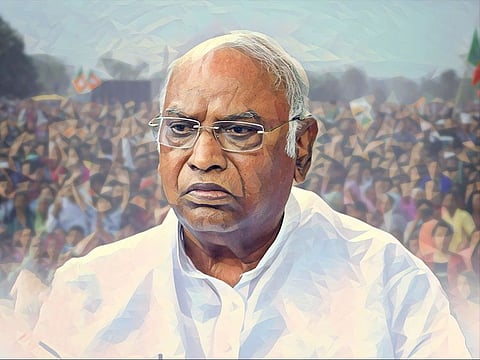Congress presidential election: Three main challenges facing Mallikarjun Kharge
As head of India’s Grand Old Party, the new Congress president has a huge cross to bear

In the end, it came down to experience versus savvy. Shashi Tharoor, 66, got nearly 12 per cent of the valid votes in a one-on-one with Mallikarjun Kharge, 80, who won with 7,897 votes.
In all, 9,385 votes were polled but the party poll panel declared 416 invalid due to incorrect marking or other such reasons.
The last Congress presidential election happened 22 years ago, when Sonia Gandhi was challenged by Jitendra Prasad. Predictably, Gandhi won that time.
Fast forward to 2022, Congress has a non-Gandhi at the helm. The development is seen as a record of sorts because we now have a non-Gandhi at the helm of India’s principal opposition party — after nearly a quarter of a century.
The fact that Sonia Gandhi, in a break from convention, visited Kharge’s home in New Delhi to greet him offers the first glimpse that the latter may be seen a Gandhi loyalist, but the Congress first family is willing to offer him the freedom to be his own person, and take up the leadership mantle — for now.
Be as it may, the new Congress chief has a host of issues in front of him. As the octogenarian leader takes on a fresh mantle, three challenges stand out.
India’s opposition unity
India’s opposition unity is almost non-existent. In a democracy — one as diverse as India — that is a disgrace.
Given how formidable the ruling BJP is — not to speak of Prime Minister’s own personal popularity — opposition unity is paramount but it does not exist at the moment. That is because Congress has been unable to get its act together. Will the new boss do things differently?
At some point Kharge will have to take a call on whether to revive the United Progressive Alliance (UPA) by reaching out to regional bigwigs like Mamata Banerjee, Nitish Kumar, Sharad Pawar, Uddhav Thackeray etc.
Congress organisational reform
The Congress is in a serious disarray. With a number of leaders making a beeline for the exit door, some of them citing the lack of elbow room in the party, an organisational revamp is in order.
Many would want Kharge to start with the shake up of the party’s top descion-making body — the Congress Working Committee (CWC). Elections to the CWC were last held in 1997.
Will he push for elections to be held for the CWC? If the reform of the party begins right at the top, the message that will percolate down to the ranks will be one of change.
A more youthful party
Kharge is 80. Sonia Gandhi is 75. Most of the Congress leaders are septuagenarians.
India’s median age is 28.4 against a global value of 30.3 years. It is time that Congress — with its countrywide base and close to 20% votes — injects fresh blood at every level and does away with the gaps between the young and the old in the party.
The fact that Shashi Tharoor managed to get close to 12% of the vote, despite Kharge being the de facto ‘establishment’ candidate, may have a subtle message in itself: Time to allow the youth a greater say is now.
Younger leaders — starting from Tharoor and the next gen like Sachin Pilot, Priyanka Gandhi could be allowed more heft.
Kharge might start with allowing a mix of experience and youth with the party’s Udaipur Declaration (that emphasised on bringing in young faces into leadership roles) as the benchmark.



